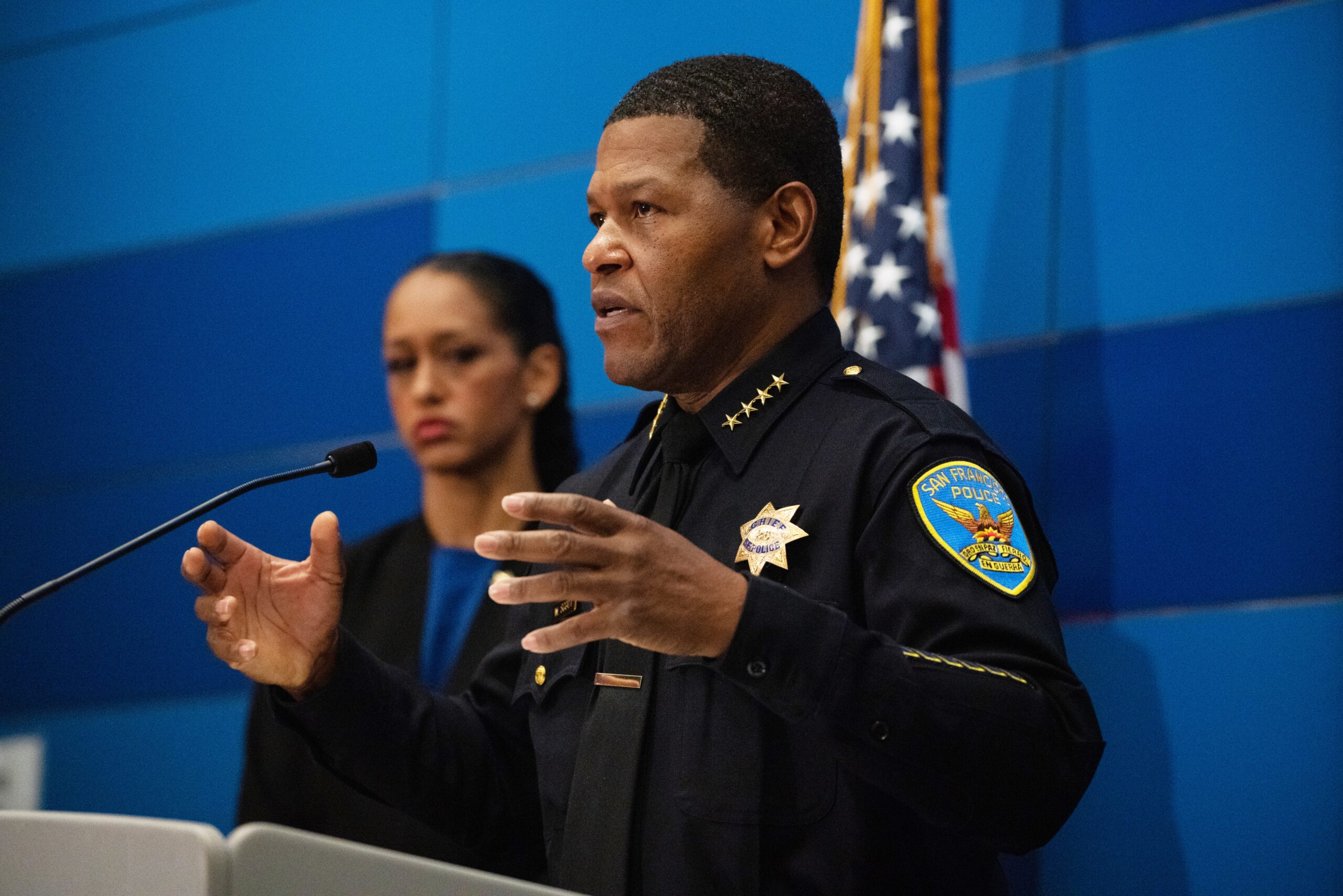In the lead-up to the recall of District Attorney Chesa Boudin, San Francisco Police Chief Bill Scott added fuel to the fire with a sudden announcement.
He said he’d pull out of a key oversight pact that put prosecutors in charge of leading the criminal investigations into San Francisco police shootings and other serious cases.
His central accusation was that Boudin’s office violated the agreement by unfairly withholding information from SFPD while investigating an officer for striking a man with a baton. Boudin denied the allegation. But Scott said his department should have received the information for a parallel investigation into whether the man committed domestic violence.
Now, after Scott held off on his threat under mounting political pressure, the chief is back with a renegotiated version of the oversight deal that’s meant to streamline information-sharing between the two agencies.
And this time, Scott got to hammer out the terms with a different district attorney, Brooke Jenkins, who pledged to rebuild the fraught relationship between his department and her office after she helped oust Boudin.
But the chief hit a roadblock Wednesday night when he asked the SF Police Commission to approve the agreement and send the proposal into labor negotiations with the police union.
The civilian oversight panel instead voted 4-3 to send the proposal back to the negotiating table. One commissioner went so far as to question whether the plan defeated the purpose of having the agreement in the first place.
The primary concern shared by several commissioners was that the proposal left out the Department of Police Accountability (DPA), despite city law requiring the police watchdog agency to investigate all police shootings.
“I don’t think we are there yet,” commissioner Kevin Benedicto said, “and don’t yet feel comfortable approving this.”
Commission President Cindy Elias and Vice President Max Carter-Oberstone, who voted alongside commissioners Benedicto and Jesus Yanez to send the proposal back to negotiations, echoed his concerns.
DPA Chief of Staff Sarah Hawkins said the proposal should ensure her investigators have access to crime scenes, interviews and evidence, as well as notifications when the DA’s office makes a charging decision.
Without those assurances in writing, Hawkins said her agency will continue to have issues carrying out its independent investigations.
Scott countered that his department should reach a separate deal with the DPA, and already has procedures to share information.
“I just don’t see the value of a document that puts all this stuff about DPA in it,” Scott told the commission. “This is really about the SFPD and the DA’s office and the issues that brought us here that I believe have been resolved.”
Scott drew support from commissioner Jim Byrne, who acknowledged that the proposal was “flawed” but supported the new version.
“There is clearly a concern there, but realistically those discussions, those concerns should be addressed separately,” Byrne said, since the commission has jurisdiction over the SFPD and DPA, but not the DA.
Byrne argued that the commission should adopt the proposal for a four-month period because it was better than the existing version. He also reasoned that the proposal would expire shortly after voters decide whether Jenkins gets to keep her job, so that the next elected district attorney could weigh in.
“If there is another incident, we could end up in the same situation that we had six months ago,” Byrne said, referring to the controversy that prompted the chief to take his sudden action earlier this year.
But Carter-Oberstone blasted the proposal for giving police too much access to information unearthed by investigations meant to be independent. He said the plan could put officers in a difficult position where they had to keep evidence—which defendants would not normally have—secret from their colleagues.
“What this document really does is it basically says SFPD is going to get real-time access to all information that is collected by the DA in the course of its investigation,” he said. “That just struck me because it seems the whole point of this document is to ensure independent investigations.”
Carter-Oberstone and Scott disagreed on the extent to which the proposal allowed the District Attorney’s Office to not disclose evidence to police. Scott said the agreement created a process for resolving disputes over whether evidence needed to be turned over.
“The assumption that there is just going to be this free-for-all of the District Attorney’s Office handing over information that we have no business having,” Scott said, “I don’t think that’s going to happen.”
The decision came down to a motion from Benedicto to send the agreement back to negotiations, and direct the chief to share the commission’s concerns with the District Attorney’s Office and mediator overseeing the process.
Commissioners Byrne, Larry Yee and Debra Walker cast the opposing votes.
The commission also voted unanimously to direct police to meet with DPA about the issue and report back within 45 days.
